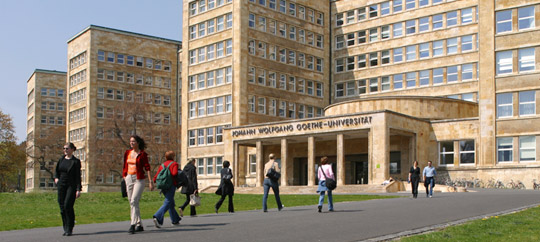Другие журналы
scientific edition of Bauman MSTU
SCIENCE & EDUCATION
Bauman Moscow State Technical University. El № FS 77 - 48211. ISSN 1994-0408
Too Many Students and Not Enough Chairs in Germany▓s Universities
22.05.2011
 Migration and Education, a seminar class led by Professor Merle Hummrich at Johann Wolfgang Goethe University in Frankfurt, was intended for 50 students, limited by how many term papers she could grade. But according to Carmen Eckstein, a student who vied for one of the spots, 400 students showed up the first day. For lack of seats, most sat on the floor or stood during the seminars.
Migration and Education, a seminar class led by Professor Merle Hummrich at Johann Wolfgang Goethe University in Frankfurt, was intended for 50 students, limited by how many term papers she could grade. But according to Carmen Eckstein, a student who vied for one of the spots, 400 students showed up the first day. For lack of seats, most sat on the floor or stood during the seminars.Professor Benjamin Ortmeyer teaches on the misuses of education during the Nazi era. His lecture hall is designed for 500 people, but 720 students are registered for his course and about 600 show up every week. “I couldn’t understand the students if they didn’t protest,” he said.
And protest they do, as German public universities, already overcrowded, brace for even more students. Florian Muhs, part of a student working group on overcrowding at the University of Frankfurt, says many come to him to complain.
“There are not enough professors, and the rooms are not big enough,” he said.
The group has written an open letter to the president of the university and state officials, and he says the student body might consider protests. “It’s all about getting attention, especially from people who aren’t directly affected by the situation,” Mr. Muhs said.
Chancellor Angela Merkel pledged that Germany would become a republic of education in a widely publicized speech in 2008, and her dream is quickly becoming fulfilled. Several factors are fueling the rise, including a desire for the life opportunities provided by a university education, the abolition of mandatory military service, and a reduction of one year in the high school curriculum.
But Professor Matthias Jaroch, spokesman for the German Association of Professors and Lecturers, says the government is failing to back her vision with cash, causing a crisis of overcrowding. The association demands that the state and federal governments put more money into education. “We are now working at a ratio of 60 students to one professor,” he said. “The system is no longer tenable.”
Some universities say they are trying to plan ahead by hiring more teaching staff and providing more rooms. Academics and experts agree, however, that more government money is needed to fix an outdated system that will have to accommodate a tide of students in the years to come.
About 200,000 students have been added to the university system in the past three years, an increase of about 10 percent, according to the German office of statistics. By 2020, the number of students is expected to grow an additional 300,000 students, Mr. Jaroch said.
Johann Wolfgang Goethe University has seen its student population spike to about 38,000 students, a rise of 7,000 in the past three years, Olaf Kaltenborn, a spokesman for the university, said.
Most departments have enrollments that exceed their capacity, Mr. Kaltenborn said. The department for history and philosophy, for one, is at 170 percent of capacity. The pressure is only expected to rise: the university has set up a task force to deal with the extra students arriving as German high schools eliminate the 13th year of study during the next few years. “We don’t want to be thought of as facing the storm blindly,” Mr. Kaltenborn said.
According to Ms. Eckstein, the student in Mr. Hummrich’s course, students are warned by their peers that because of overcrowding, newcomers like her will not be able to take a full course load. More senior students get preference so that they can graduate.
The first sentence out of the professor’s mouth, she said, is usually, “First semester students have to go.”
Source: New York Times
| Authors |
| Press-releases |
| Library |
| Conferences |
| About Project |
| Phone: +7 (915) 336-07-65 (строго: среда; пятница c 11-00 до 17-00) |
|
||||
| © 2003-2024 «Наука и образование» Перепечатка материалов журнала без согласования с редакцией запрещена Phone: +7 (915) 336-07-65 (строго: среда; пятница c 11-00 до 17-00) | |||||



